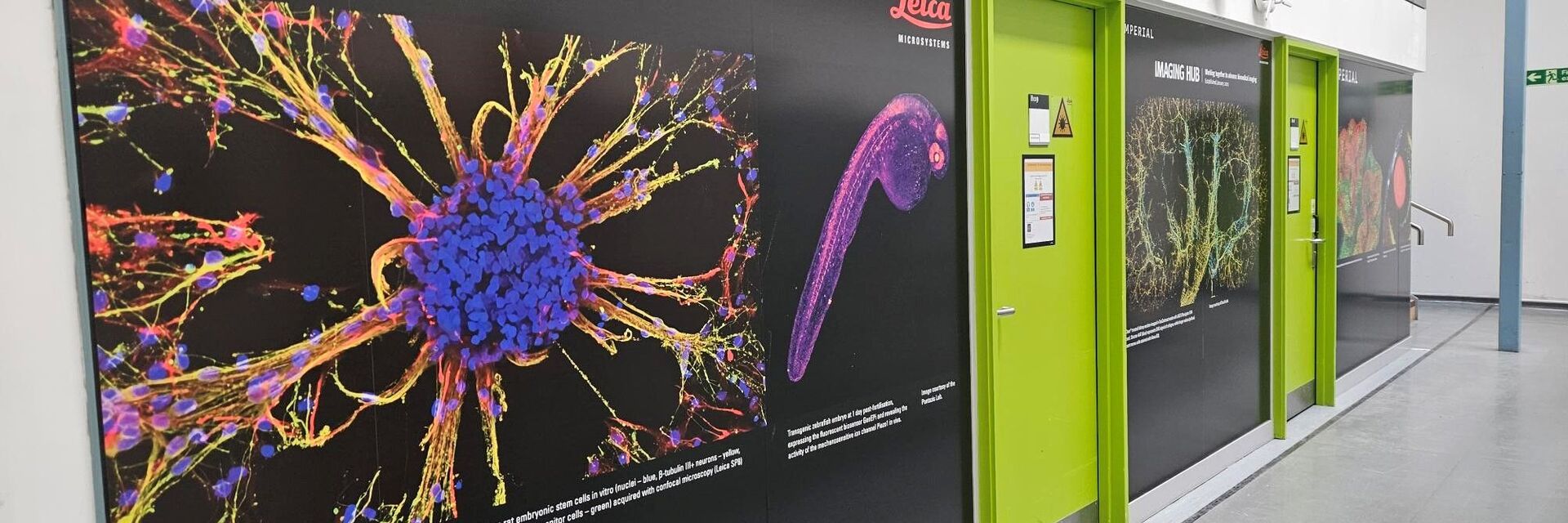On April 17, 2024, over 50 scientists, primarily from academic institutes across the greater London area, joined Leica Microsystems and Imperial College London for an Imaging Symposium followed by hands-on workshops. The event showcased the innovative microscopy solutions from Leica within the Imaging Hub, including Mica, THUNDER Imagers and STELLARIS 8 confocal platforms, alongside Aivia AI Image Analysis Software.
The event presented a unique opportunity to raise awareness of the Imaging Hub, which was established in January 2021, and its ongoing mission to create a microscopy knowledge centre where experts from academia and industry come together to share knowledge through workshops and seminars.
Dr Periklis (Laki) Pantazis is Director of the Imaging Hub and is also a Reader in Advanced Optical Precision Imaging at Imperial’s Department of Bioengineering. Laki works alongside Miguel Angel Hermida Ayala, Imaging Hub Manager. Together with Application Specialists from Leica Microsystems, who advise on technical aspects and questions relating to imaging workflows, the team are helping to advance biomedical imaging through scientific applications using the technologies and software provided by Leica.
The Imaging Hub’s state-of-the-art microscope systems are open to any researchers to use, empowering more scientists to tackle bold research questions. Within the Imaging Hub, two large rooms accommodate the microscopy systems, with an additional room specifically for image analysis. There is also a dedicated tissue culture area for sample preparation, with support facilities nearby.
Speaking about what the Imaging Hub offers to users, Laki says, “In addition to the systems, application support and workshops, researchers have the opportunity to collaborate with the Leica team, which enhances their research capabilities and helps Leica remain at the forefront of innovation. Regular feedback from an application specialist helps you to fully utilise the capabilities of the systems. This enables you to rapidly acquire high-quality data, crucial for gathering preliminary results for your next grant application or completing the final revision of a manuscript under review.
Darin Stell, Senior VP Global Commercial operations at Leica Microsystems says, “Partnerships between instrument manufacturers and academia are incredibly important in order to keep up with the rate of change in the life science industry and Leica Microsystems is delighted to be part of this ongoing collaboration with Imperial College London. Both sides share a motivation and vision to accelerate research and human health by conducting experiments using innovative microscopy”.
_________________________________________
About Leica Microsystems
Leica Microsystems develops and manufactures microscopes and scientific instruments for the analysis of microstructures and nanostructures. Ever since the company started as a family business in the nineteenth century, its instruments have been widely recognized for their optical precision and innovative technology. It is one of the market leaders in compound and stereo microscopy, digital microscopy, confocal laser scanning microscopy with related imaging systems, electron microscopy sample preparation, and surgical microscopes.
Find out more at www.leica-microsystems.com
About Imperial College London
Imperial College London is one of the world's leading universities. The College's 17,000 students and 8,000 staff are expanding the frontiers of knowledge in science, medicine, engineering and business, and translating their discoveries into benefits for our society.




